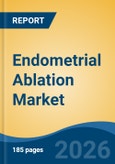Speak directly to the analyst to clarify any post sales queries you may have.
10% Free customizationThis report comes with 10% free customization, enabling you to add data that meets your specific business needs.
However, the market faces significant challenges regarding the long-term efficacy of these procedures and the risk of post-operative complications. A major barrier to wider adoption is the potential for treatment failure, which often leads to the need for subsequent hysterectomies, causing clinicians to hesitate when comparing the permanence of ablation against definitive surgical alternatives.
Market Drivers
The primary driver of the global endometrial ablation market is the rising prevalence of abnormal uterine bleeding (AUB) and menorrhagia, especially within the aging reproductive demographic. As women near perimenopause, menstrual irregularities become more frequent, creating a large patient population seeking effective, uterus-sparing treatments, which directly translates into higher procedural volumes as patients choose less invasive options over major surgeries. This increasing clinical burden is highlighted by a study in the Medical Journal of Australia from March 2025, which found that the prevalence of heavy menstrual bleeding rises significantly with age, affecting 32.1% of women at 48 years, thereby reinforcing the urgent need for reliable non-hysterectomy solutions.Simultaneously, the market is being transformed by technological advancements in second-generation ablation devices, particularly radiofrequency and minimally invasive systems. These innovations provide better safety profiles and shorter recovery times, promoting their adoption in outpatient settings, while leading manufacturers report sustained financial growth linked to these portfolios. For instance, Hologic, Inc. reported in February 2025 that its GYN Surgical division achieved $166.3 million in revenue, a 2.5% increase driven by minimally invasive solutions, and Olympus Corporation announced in May 2025 that its Therapeutic Solutions Division saw a 6.9% revenue rise, confirming the expanding commercial success of advanced gynecological technologies.
Market Challenges
The growth of the Global Endometrial Ablation Market is significantly hindered by the risk of long-term treatment failure, which often necessitates secondary surgical interventions. Although the procedure is valued for being minimally invasive, the potential for endometrial regrowth can lead to the recurrence of heavy menstrual bleeding, causing hesitation among clinicians and patients who may view hysterectomy as a more reliable solution for permanent relief. Consequently, the preference for a one-time curative surgery over a technique with variable durability limits the widespread adoption of ablation devices.Furthermore, the clinical and economic burden of repeat procedures negatively impacts market potential, as the initial benefits of reduced recovery time and hospital stays are effectively negated when patients require subsequent surgeries. This issue is substantiated by a 2024 longitudinal analysis from the European Society for Gynaecological Endoscopy, which indicated that approximately 16.5% of women underwent a hysterectomy within five years of their initial endometrial ablation, highlighting the significant challenge of re-intervention that restricts the market’s trajectory.
Market Trends
A major trend reshaping the industry is the accelerated transition toward ambulatory and office-based surgical settings, driven by the demand for cost-effective, streamlined workflows that reduce logistical burdens on healthcare providers. This shift is actively supported by the development of single-use, pre-assembled convenience kits that remove the complexity of sourcing and sterilizing individual components, thereby facilitating easier adoption in non-hospital environments. Illustrating this operational evolution, Minerva Surgical announced in May 2025 the launch of the HERizon™ Hysto-Kit, a comprehensive single-use package designed to save time and ensure procedural consistency for clinicians performing hysteroscopy in outpatient settings, directly addressing the growing demand for efficient care outside the traditional operating room.In parallel, the market is witnessing the rise of cryoablation solutions as a distinct alternative to heat-based modalities, focusing on enhanced patient comfort and reduced intra-operative anesthesia requirements. Unlike radiofrequency systems that rely on thermal energy, cryotherapy uses extreme cold to destroy the endometrial lining, offering a natural analgesic effect that makes it particularly suitable for awake procedures in office environments. Validating the rising adoption of this technology, Channel Medsystems announced in November 2025 that it had surpassed 5,000 procedures with its Cerene® Cryotherapy device, underscoring the expanding clinical acceptance of this novel approach for managing heavy menstrual bleeding.
Key Players Profiled in the Endometrial Ablation Market
- Boston Scientific
- Hologic
- Minerva Surgical
- CooperSurgical
- Medtronic
- Olympus
- Karl Storz
- Ethicon
- Stryker
- Johnson & Johnson
Report Scope
In this report, the Global Endometrial Ablation Market has been segmented into the following categories:Endometrial Ablation Market, by Product:
- Cryoablation
- Radiofrequency Ablation
- Hydrothermal Ablation
- Thermal Balloon
- Microwave Energy
- Others
Endometrial Ablation Market, by End Use:
- Hospitals & Clinics
- Ambulatory Surgical Centers
- Others
Endometrial Ablation Market, by Region:
- North America
- Europe
- Asia-Pacific
- South America
- Middle East & Africa
Competitive Landscape
Company Profiles: Detailed analysis of the major companies present in the Global Endometrial Ablation Market.Available Customization
The analyst offers customization according to your specific needs. The following customization options are available for the report:- Detailed analysis and profiling of additional market players (up to five).
This product will be delivered within 1-3 business days.
Table of Contents
Companies Mentioned
The key players profiled in this Endometrial Ablation market report include:- Boston Scientific
- Hologic
- Minerva Surgical
- CooperSurgical
- Medtronic
- Olympus
- Karl Storz
- Ethicon
- Stryker
- Johnson & Johnson
Table Information
| Report Attribute | Details |
|---|---|
| No. of Pages | 185 |
| Published | January 2026 |
| Forecast Period | 2025 - 2031 |
| Estimated Market Value ( USD | $ 2.09 Billion |
| Forecasted Market Value ( USD | $ 2.87 Billion |
| Compound Annual Growth Rate | 5.4% |
| Regions Covered | Global |
| No. of Companies Mentioned | 11 |









